Friday, August 17, 2007
Don't fix what isn't broken
Now that all of Chavez's consitutional reforms have been presented and nicely summarized in the preceding post the question is - are they something Venezuelans should support or not?
Many of them are somewhat ambigious and difficult to know how they would actually impact anything - changing the governance structure of Caracas for example.
Nevertheless there are two which make me think Venezuelan voters, when given the chance, should send this whole project back to the drawsing board.
First is the subject of eliminating term limits. I personally don't have any problem with eliminating term limits. Let Venezuelans elect who they want - and in particular whatever president they want. But extending the presidential term to 7 years?!?!?! That at the very least is just plain bizarre.
At 6 years Venezuelan presidential terms are already very long. In fact, the only real justification for having that long is if you don't allow re-election. But they do; hence Venezuelan presidential terms are already aguably too long. Yet they now want to increase them further?!?! And why by one year to 7 years?
Seven years, even with recall rights, is just too long. I really would have thought that in proposing unlimited re-election that Chavez would have decided to make terms shorter, say four or five years. Instead he went in the wrong direction. That is certainly one reason to reject this reform.
Second is the subject of shortening the workday. The standard work day will be shortened from 8 hours to 6 hours. That sounds appealing as most people could use more leisure time.
However, I am afraid it is a misconcieved reform though that overlooks basic economic realities that Venezuela confronts.
It is said that a six hour work day will create more jobs. It is possible that is true, but it doesn't create them in the way Venezuela needs them created. Lets look at an example. Suppose there is a job performed 24 hours a day with three different people working three different shits of 8 hours. Now that would be staffed with 4 people working 6 hours shifts. Sounds good, right? Now you have another person employed.
Thing is, though, they are all going to earn less money as they all work 25% less time. If it is mandated that they all be paid the salaries that previously existed then all private industry will be less profitable and there will be less of it and the government will be that much more costly (and contrary to rumors the Venezuelan government does NOT have infinite resources). And given that most Venezuelan worders have low wages to being with a 25% pay cut is not something they are likely to accept.
This type of reform might work in Europe, Japan, or North America where people can afford to give up some of their wages for more leisure time. In underdeveloped countries like Venezuela it won't work. This measure, if implemented, would simply serve to make life that much easier for those who already have leisurely buearacratic jobs at public institutions.
Venezuela DOES need more jobs. But it needs them to be created by expanding the productive apparatus of the country. That is, there needs to be a LOT more companies, public or private, creating a lot more wealth before a measure such as this could work. Otherwise, one is simply redistributing very limited resources which are already too meager. As even Marx pointed out, socialism without an already developed economy is simply redistributing poverty.
As it stands there is nothing fundamentally wrong with the current Constitution. Venezuela has many problems, but they can largely be dealt with within the framework of the current Constitution. And Chavez has five and a half years in which he can work to solve those problems before terms limits would even become an issue. So unless something better can be devised at this point the best option is for the Constitution to be left unchanged.
|
Many of them are somewhat ambigious and difficult to know how they would actually impact anything - changing the governance structure of Caracas for example.
Nevertheless there are two which make me think Venezuelan voters, when given the chance, should send this whole project back to the drawsing board.
First is the subject of eliminating term limits. I personally don't have any problem with eliminating term limits. Let Venezuelans elect who they want - and in particular whatever president they want. But extending the presidential term to 7 years?!?!?! That at the very least is just plain bizarre.
At 6 years Venezuelan presidential terms are already very long. In fact, the only real justification for having that long is if you don't allow re-election. But they do; hence Venezuelan presidential terms are already aguably too long. Yet they now want to increase them further?!?! And why by one year to 7 years?
Seven years, even with recall rights, is just too long. I really would have thought that in proposing unlimited re-election that Chavez would have decided to make terms shorter, say four or five years. Instead he went in the wrong direction. That is certainly one reason to reject this reform.
Second is the subject of shortening the workday. The standard work day will be shortened from 8 hours to 6 hours. That sounds appealing as most people could use more leisure time.
However, I am afraid it is a misconcieved reform though that overlooks basic economic realities that Venezuela confronts.
It is said that a six hour work day will create more jobs. It is possible that is true, but it doesn't create them in the way Venezuela needs them created. Lets look at an example. Suppose there is a job performed 24 hours a day with three different people working three different shits of 8 hours. Now that would be staffed with 4 people working 6 hours shifts. Sounds good, right? Now you have another person employed.
Thing is, though, they are all going to earn less money as they all work 25% less time. If it is mandated that they all be paid the salaries that previously existed then all private industry will be less profitable and there will be less of it and the government will be that much more costly (and contrary to rumors the Venezuelan government does NOT have infinite resources). And given that most Venezuelan worders have low wages to being with a 25% pay cut is not something they are likely to accept.
This type of reform might work in Europe, Japan, or North America where people can afford to give up some of their wages for more leisure time. In underdeveloped countries like Venezuela it won't work. This measure, if implemented, would simply serve to make life that much easier for those who already have leisurely buearacratic jobs at public institutions.
Venezuela DOES need more jobs. But it needs them to be created by expanding the productive apparatus of the country. That is, there needs to be a LOT more companies, public or private, creating a lot more wealth before a measure such as this could work. Otherwise, one is simply redistributing very limited resources which are already too meager. As even Marx pointed out, socialism without an already developed economy is simply redistributing poverty.
As it stands there is nothing fundamentally wrong with the current Constitution. Venezuela has many problems, but they can largely be dealt with within the framework of the current Constitution. And Chavez has five and a half years in which he can work to solve those problems before terms limits would even become an issue. So unless something better can be devised at this point the best option is for the Constitution to be left unchanged.
|
Wednesday, August 15, 2007
Constitutional reform game thread
Flanker:Will try to keep updated
33 articles to change
Article 11 - Add: The president can set up military defense zones inside the sovereign territory (install bases and artificial islands near isla de aves due to the "Economic exclusive zone")
Article 16 - Returning Caracas as a Federal district. and "Imsular district" for "economic exclusive zone" (200 Km of economic territory near islands or coastal areas) No new territory or municipality cannot be created without the citizens of said territory to approving it by referendum, All settlements regardless of size to be recognized as cities, establishment of comunities, comons and cities as geopolitical structuring. The people will govern the comunities and comons with direct people power. A city can become after comunal reorganization and referendum into a comunal city.
President can create (after a territorial referendum)
"Functional districts" or "Federal provinces" or inter-state territories defined on geography or economic potential with a specific strategic plan (think new quasi-states) with vicepresidents.
"Federal cities" same strategic plan but for cities
Article 18 - City of Caracas will be territorially re-established
Article 70 - Added Comunal powers and assortments of grassroot cells in particular "comunal cooperatives"
Article 87 - Small self-employed workers will get a social stability fund (vacations, pensions, rest, birth related).
Article 90 - 6 hour workdays and 36 hour workweek
Article 100 - Honors indeginous, african roots, and anything related with their culture get special govt treatment.
Article 112 - Promotion of economic policies of comunities over individualism, and the economy is socialist.
Article 113 - Stronger wording against monopolies
Article 115 - Recognizes and guarantees public, social (direct and indirect), collective, private property also adds mixed which is a combination of the above.Changes in expropiations.
Article 136 - Popular power (comunity councils) is added to match the other governmental powers. Popular->municipal->states->national.
Article 158 - The state will transfer power to the comunities, and create democratic socialism.Popular power will enjoy fiscal independence.
Article 225 - Multiple vicepresidencies.
Article 230 - Indefinite reelection... 7 years each
|
33 articles to change
Article 11 - Add: The president can set up military defense zones inside the sovereign territory (install bases and artificial islands near isla de aves due to the "Economic exclusive zone")
Article 16 - Returning Caracas as a Federal district. and "Imsular district" for "economic exclusive zone" (200 Km of economic territory near islands or coastal areas) No new territory or municipality cannot be created without the citizens of said territory to approving it by referendum, All settlements regardless of size to be recognized as cities, establishment of comunities, comons and cities as geopolitical structuring. The people will govern the comunities and comons with direct people power. A city can become after comunal reorganization and referendum into a comunal city.
President can create (after a territorial referendum)
"Functional districts" or "Federal provinces" or inter-state territories defined on geography or economic potential with a specific strategic plan (think new quasi-states) with vicepresidents.
"Federal cities" same strategic plan but for cities
Article 18 - City of Caracas will be territorially re-established
Article 70 - Added Comunal powers and assortments of grassroot cells in particular "comunal cooperatives"
Article 87 - Small self-employed workers will get a social stability fund (vacations, pensions, rest, birth related).
Article 90 - 6 hour workdays and 36 hour workweek
Article 100 - Honors indeginous, african roots, and anything related with their culture get special govt treatment.
Article 112 - Promotion of economic policies of comunities over individualism, and the economy is socialist.
Article 113 - Stronger wording against monopolies
Article 115 - Recognizes and guarantees public, social (direct and indirect), collective, private property also adds mixed which is a combination of the above.Changes in expropiations.
Article 136 - Popular power (comunity councils) is added to match the other governmental powers. Popular->municipal->states->national.
Article 158 - The state will transfer power to the comunities, and create democratic socialism.Popular power will enjoy fiscal independence.
Article 225 - Multiple vicepresidencies.
Article 230 - Indefinite reelection... 7 years each
|
A good laugh
In Venezuela there is political advertising and graphiti everywhere. A huge amount of it comes from the government - a topic for another day.
But when it comes to propoganda that will put you in stiches with hysterical laughter - well for that you need the opposition. Check out this non-sense which has been painted on walls all over Venezuela:
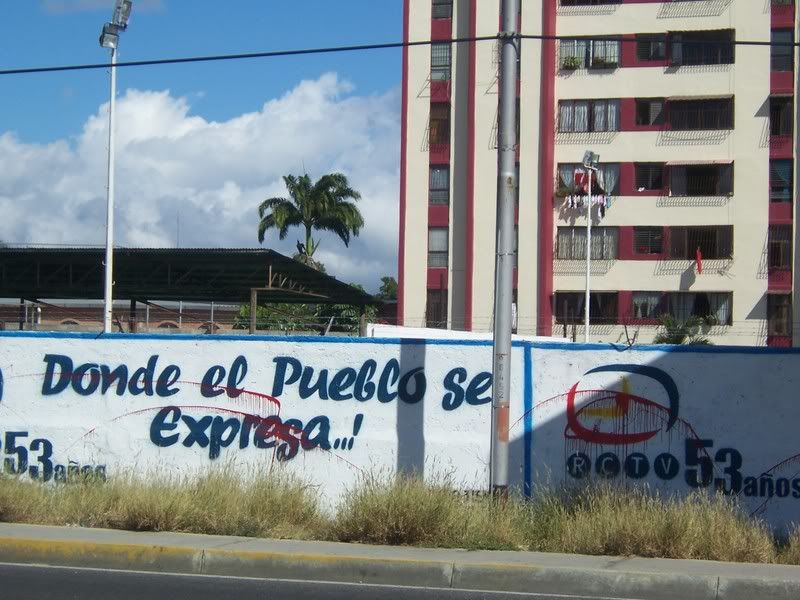
This painting on behalf of the now cable TV station RCTV says "Where the people express themselves". Ah, yeah, sure. The "people" really spent the past 53 years expressing themselves through RCTV!!! On the evening of April 11, 2002 when the military officers partaking in the coup were on RCTV giving orders to other military units to surrender that was the "people" who wanted that on the air!
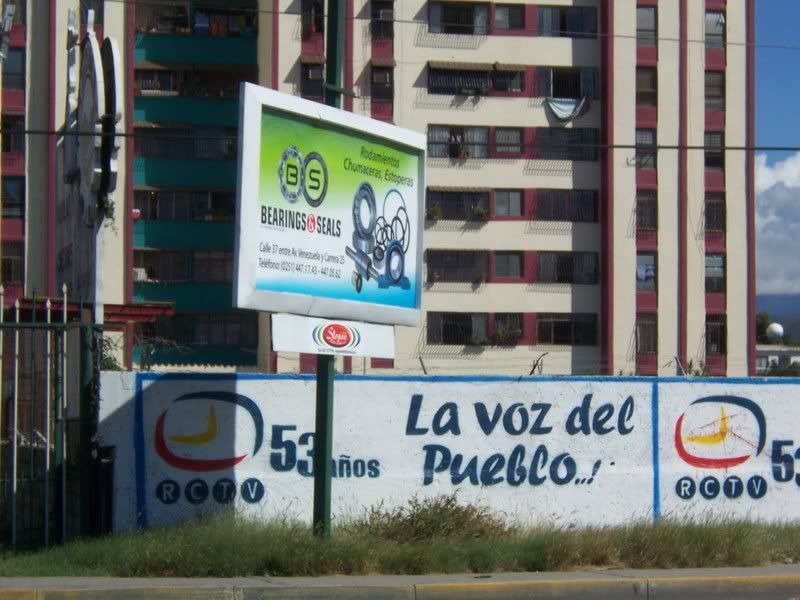
And with this painting now RCTV is supposedly "the voice of the people"!?!?!?
Truthfully, I don't know that there is any media outlet that can claim to be the voice of the people - but hell at least the people can, via elections, control who runs stations like VTV and Vive. Due to the nature of "private property" 99.9999999% of Venezuelans have no say in what was broadcast on RCTV. So much for it being the "voice of the people". Better said, it was the loud propogandistic voice that spoke to the people.
BTW, another point on a related subject. I have had occassion to waste some of my time watching the all anti-Chavez all the time news network Globovision. So far the standout image of it is not the blatant propoganda and distortions on it. I knew to expect them. Rather what made the biggest impression on me was the news anchor who was in effect wearing a bikini with a fishnet type see through top - I kid you not. Most of the women on the beach at Choroni had more clothing on than that women did.
I wonder if CBS has ever thought of boosting the ratings for their evening news by dumping Katie Couric and putting on Carmen Electra in a thong. Hey, if it works for Globovision...
|
But when it comes to propoganda that will put you in stiches with hysterical laughter - well for that you need the opposition. Check out this non-sense which has been painted on walls all over Venezuela:

This painting on behalf of the now cable TV station RCTV says "Where the people express themselves". Ah, yeah, sure. The "people" really spent the past 53 years expressing themselves through RCTV!!! On the evening of April 11, 2002 when the military officers partaking in the coup were on RCTV giving orders to other military units to surrender that was the "people" who wanted that on the air!

And with this painting now RCTV is supposedly "the voice of the people"!?!?!?
Truthfully, I don't know that there is any media outlet that can claim to be the voice of the people - but hell at least the people can, via elections, control who runs stations like VTV and Vive. Due to the nature of "private property" 99.9999999% of Venezuelans have no say in what was broadcast on RCTV. So much for it being the "voice of the people". Better said, it was the loud propogandistic voice that spoke to the people.
BTW, another point on a related subject. I have had occassion to waste some of my time watching the all anti-Chavez all the time news network Globovision. So far the standout image of it is not the blatant propoganda and distortions on it. I knew to expect them. Rather what made the biggest impression on me was the news anchor who was in effect wearing a bikini with a fishnet type see through top - I kid you not. Most of the women on the beach at Choroni had more clothing on than that women did.
I wonder if CBS has ever thought of boosting the ratings for their evening news by dumping Katie Couric and putting on Carmen Electra in a thong. Hey, if it works for Globovision...
|
Tuesday, August 14, 2007
The great Venezuelan pigout...continued.
Today, the news came out that the Venezuelan economy grew another 8.9% in the last quarter. The only thing I can think of to say is - YAWN. Quite frankly I can't motivate myself to even give the breakdown of exactly what grew how much anymore. After 15 consecutive quarters of boom it is simply too redundant.
What is an interesting twist though is just how fast consumption is growing. Yes, we knew it was growing extremely rapidly and had reached levels not seen in decades. Still, to read today that consumption so far in 2007 is up 30% over what it was during this same time last year is just amazing. No wonder shopping malls are mobbed and new ones are going up all over the place.
Here are the actual statistics from todays El Universal:
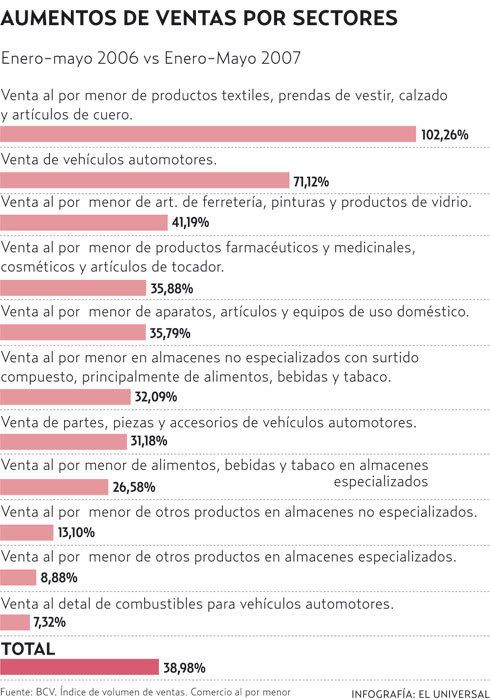
The sales of clothing are up over 100% over the already very high levels of last year!!! It is hard to know what to say other than Venezuelan consumers obviously have a lot more money in their hands and are determined to spend it.
Further, as we saw in the polling information from Sunday they feel good about their own personal situation and about the future. So says the president of the Datanalysis polling firm:
Of course, much of this boom has served to benefit foriegn manufacturers as many items being consumed are being imported. Yet as we have seen previously, manufacturing in Venezuela is way up so that local producers are also benefiting from this boom. In fact, even the supposedly besieged farming sector is seeing its output go up 16% this year!
And speaking of the food situation... again all I can say is it is all you can eat here. Last time I posted some pictures of what Venezuelan supermarkets looked like some complained I didn't show enough of the things claimed to be in short supply. So now that I can post pictures again here are some more. These are from a Hiper Jumbo grocery store and it is very typical of what I have seen around Maracay. And let me tell you - it rivals anything you find in the U.S. as a temple of consumption.
First, people complained before I didn't show enough of the dairy products. Ok here is what the dairy section was like:

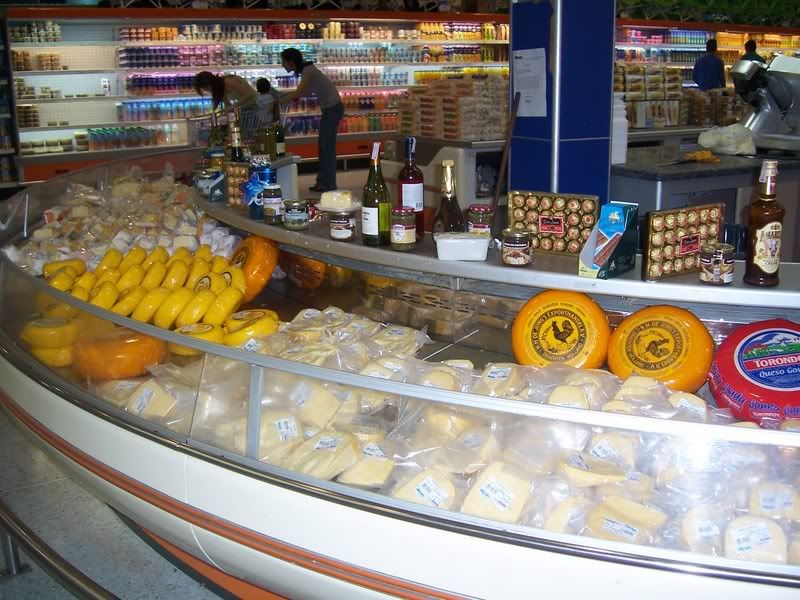
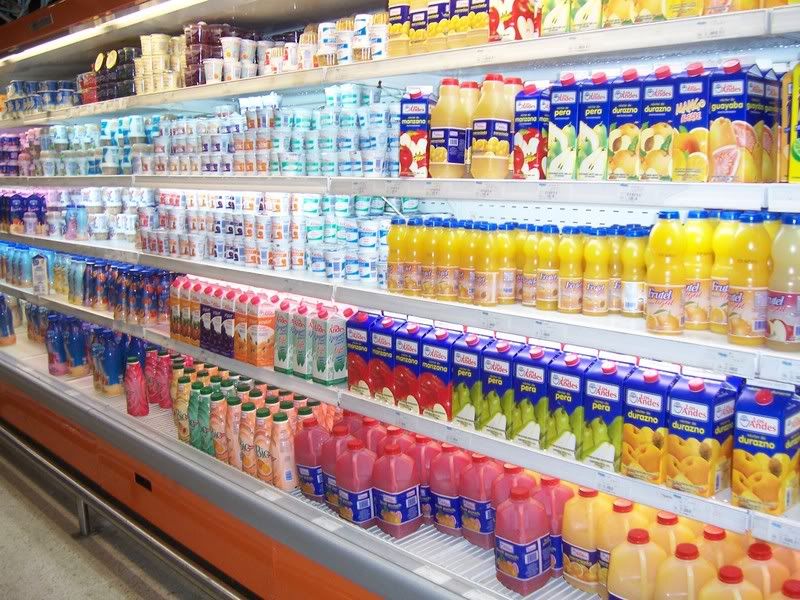
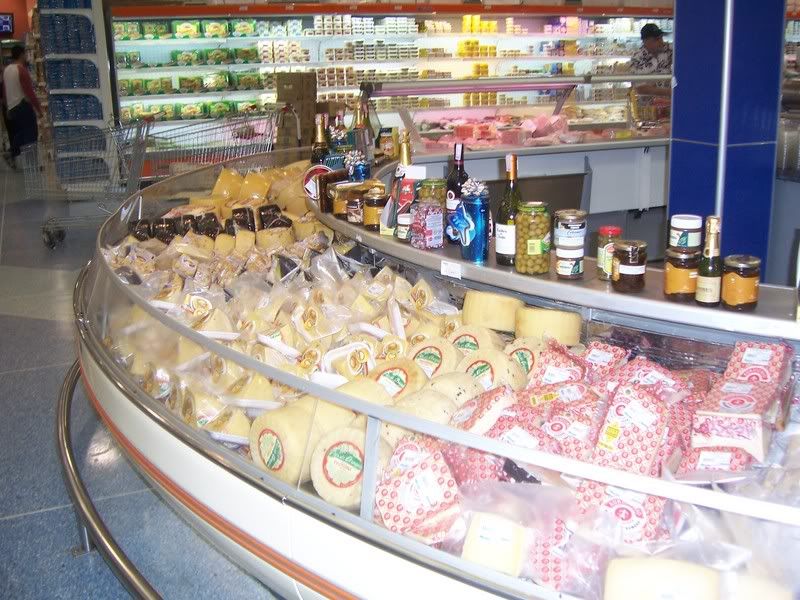
I swear to God, I see anymore cheese and I am going to throw up.
Of course, at the grocery store in Caracas the meat section was pretty skimpy. Not so here:
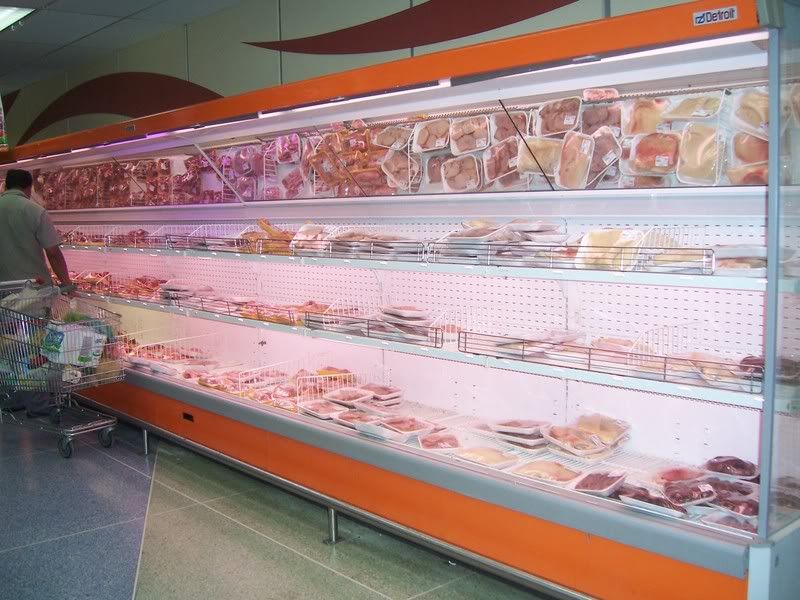
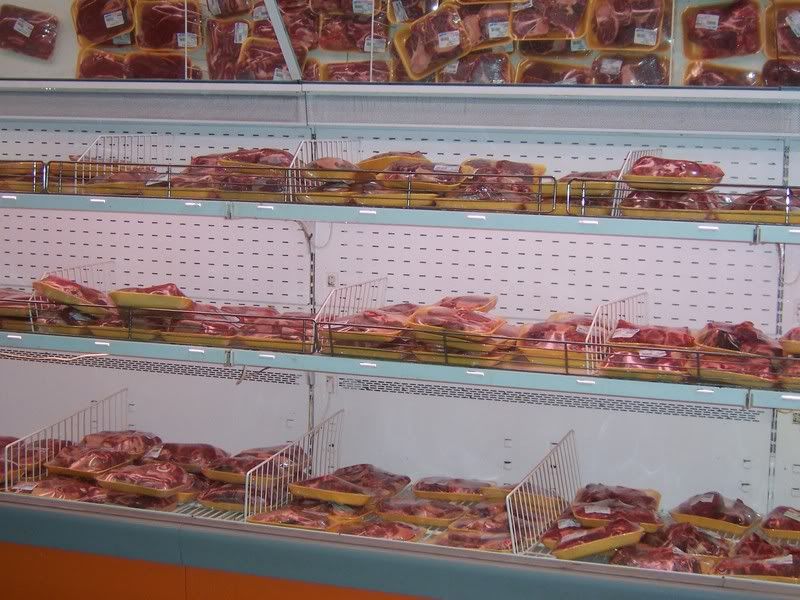

They also had plenty of things to keep vegitarians happy:
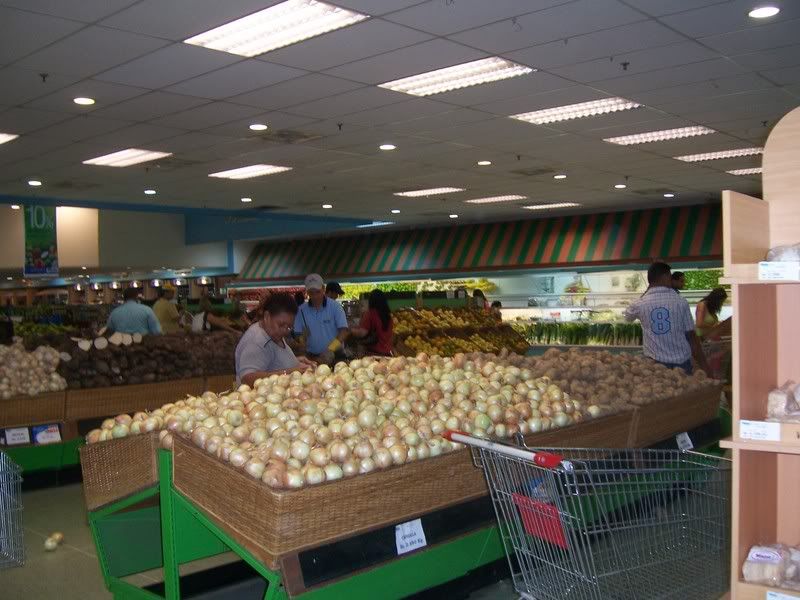
No cooking oil problems:

Nor bean shortages either:
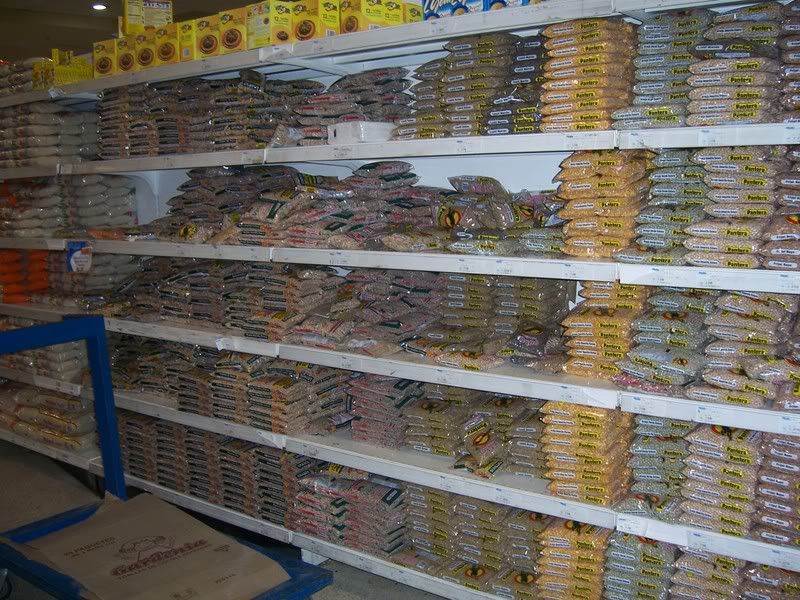
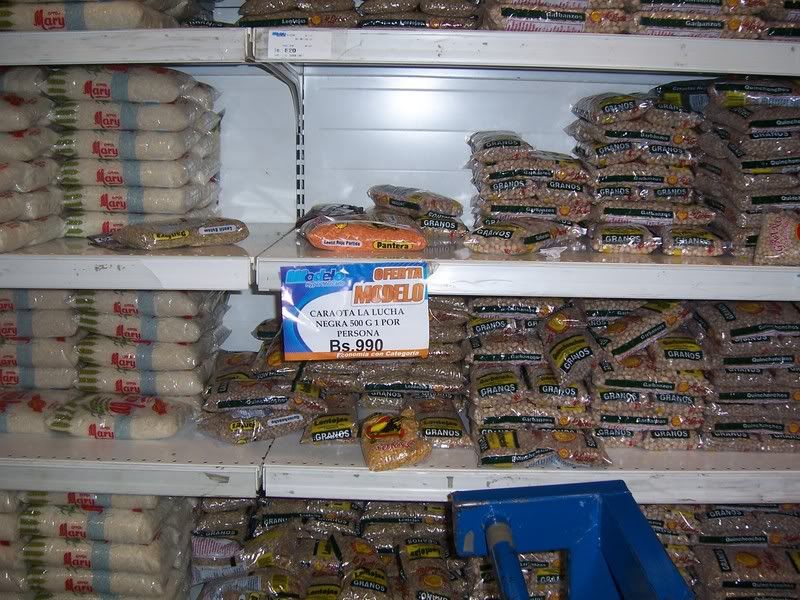
At this point the flash of my camera going off repeatedly gave me away to management and I was escorted out of the store. But once outside I did snap one last photo showing why in even such a huge store with so many customers there were no lines:
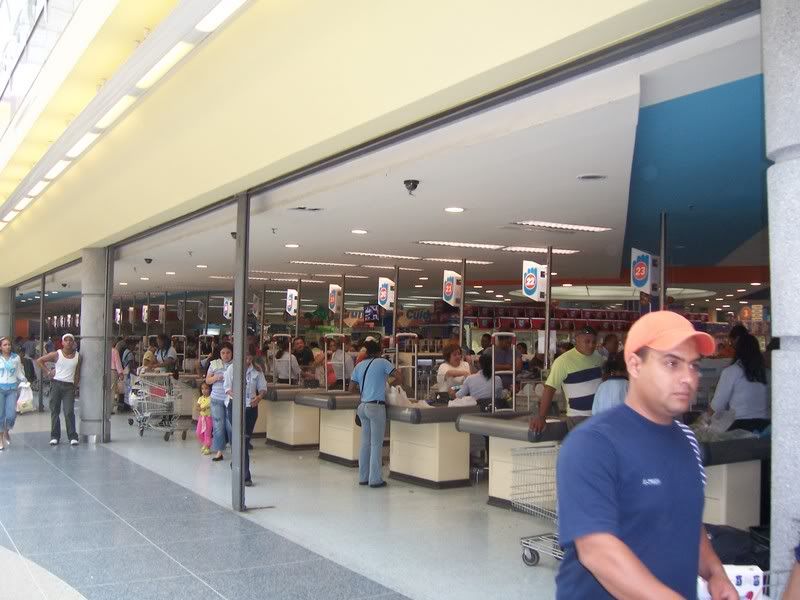
Yup, 23 check out lines, that will do it.
Seriously, you run into these gigantic Hiper Jumbo and Super Lider grocery stores all over Maracay. So anyone looking for a country short on food is going to have to look elswhere. And as for me, my days of taking pictures of shelves in grocery stores and putting them on a blog are over. It is just too tacky.
Besides, it makes me hungry. Now I am going to have some more of this for dinner:

The astute observers will note that two items on this plate are in short supply, at least if you believe the opposition propogandists. Then again, the astute observer will know better than to believe anything the opposition bullshitters say anways.
|
What is an interesting twist though is just how fast consumption is growing. Yes, we knew it was growing extremely rapidly and had reached levels not seen in decades. Still, to read today that consumption so far in 2007 is up 30% over what it was during this same time last year is just amazing. No wonder shopping malls are mobbed and new ones are going up all over the place.
Here are the actual statistics from todays El Universal:

The sales of clothing are up over 100% over the already very high levels of last year!!! It is hard to know what to say other than Venezuelan consumers obviously have a lot more money in their hands and are determined to spend it.
Further, as we saw in the polling information from Sunday they feel good about their own personal situation and about the future. So says the president of the Datanalysis polling firm:
"Polls from June show 60% view the situation of the country favorably and 80% think their economic situation will improve."
Of course, much of this boom has served to benefit foriegn manufacturers as many items being consumed are being imported. Yet as we have seen previously, manufacturing in Venezuela is way up so that local producers are also benefiting from this boom. In fact, even the supposedly besieged farming sector is seeing its output go up 16% this year!
And speaking of the food situation... again all I can say is it is all you can eat here. Last time I posted some pictures of what Venezuelan supermarkets looked like some complained I didn't show enough of the things claimed to be in short supply. So now that I can post pictures again here are some more. These are from a Hiper Jumbo grocery store and it is very typical of what I have seen around Maracay. And let me tell you - it rivals anything you find in the U.S. as a temple of consumption.
First, people complained before I didn't show enough of the dairy products. Ok here is what the dairy section was like:




I swear to God, I see anymore cheese and I am going to throw up.
Of course, at the grocery store in Caracas the meat section was pretty skimpy. Not so here:



They also had plenty of things to keep vegitarians happy:

No cooking oil problems:

Nor bean shortages either:


At this point the flash of my camera going off repeatedly gave me away to management and I was escorted out of the store. But once outside I did snap one last photo showing why in even such a huge store with so many customers there were no lines:

Yup, 23 check out lines, that will do it.
Seriously, you run into these gigantic Hiper Jumbo and Super Lider grocery stores all over Maracay. So anyone looking for a country short on food is going to have to look elswhere. And as for me, my days of taking pictures of shelves in grocery stores and putting them on a blog are over. It is just too tacky.
Besides, it makes me hungry. Now I am going to have some more of this for dinner:

The astute observers will note that two items on this plate are in short supply, at least if you believe the opposition propogandists. Then again, the astute observer will know better than to believe anything the opposition bullshitters say anways.
|
Puncturing the bubble
Flanker:I do not believe in logical fallacies, therefore for me to assume that anyone that rules a country in a sheltered manner is any better a leader than one who does not would be quite ilogical. Case in point Bush and Blair, the former would never be caught dead within a 100 feet of the daughter of a critic, and the latter used to get grilled in parliament on a recurring basis. Both were war criminals and lousy leaders. Still... one could logically conclude which leader by definition does not live in a bubble.
Chavez is somewhere in the middle, He never awards interviews to the hostile local media (whether it be for tactical or emotional reasons) so we generally have to wait for him to travel abroad for some hard hitting Q&A. Last year it was at the UN leader summit, this year was to Clarin owned TN news of Argentina. I could never imagine seeing GWB answering the questions posited in the fourth clip (re: RCTV) not to mention keeping his cool. The source is VTV so no shenanigans that they would never show this inside Venezuela.
PS Tomorrow is the big day, the constitutional reform proposal will be presented to the national assembly. Tune in for the review.
|
Chavez is somewhere in the middle, He never awards interviews to the hostile local media (whether it be for tactical or emotional reasons) so we generally have to wait for him to travel abroad for some hard hitting Q&A. Last year it was at the UN leader summit, this year was to Clarin owned TN news of Argentina. I could never imagine seeing GWB answering the questions posited in the fourth clip (re: RCTV) not to mention keeping his cool. The source is VTV so no shenanigans that they would never show this inside Venezuela.
PS Tomorrow is the big day, the constitutional reform proposal will be presented to the national assembly. Tune in for the review.
|
Monday, August 13, 2007
Giving access to the power of the printed word
In traveling through the central Venezuelan state of Aragua I had noticed a number of buildings with the term "Bibliotecas Virtuales" (virtual libraries) on them. While walking through the winding streets of a small costal town I again saw one:
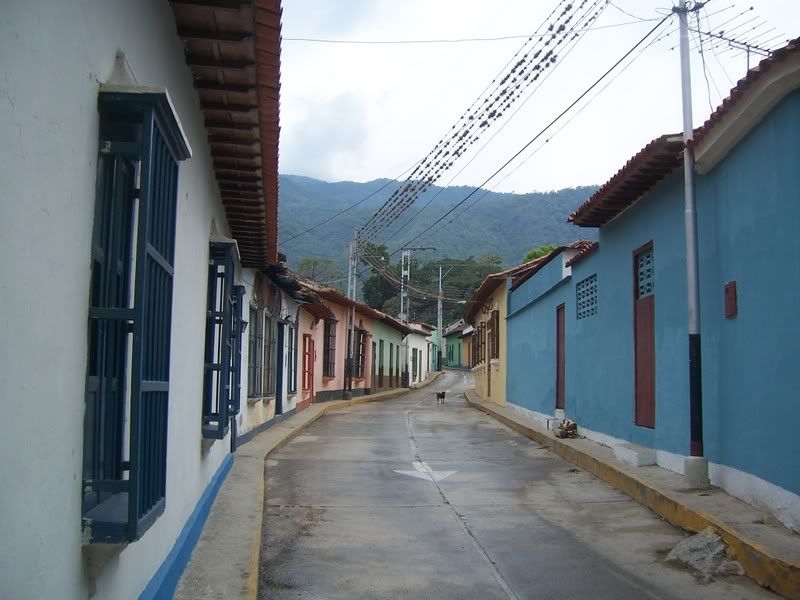
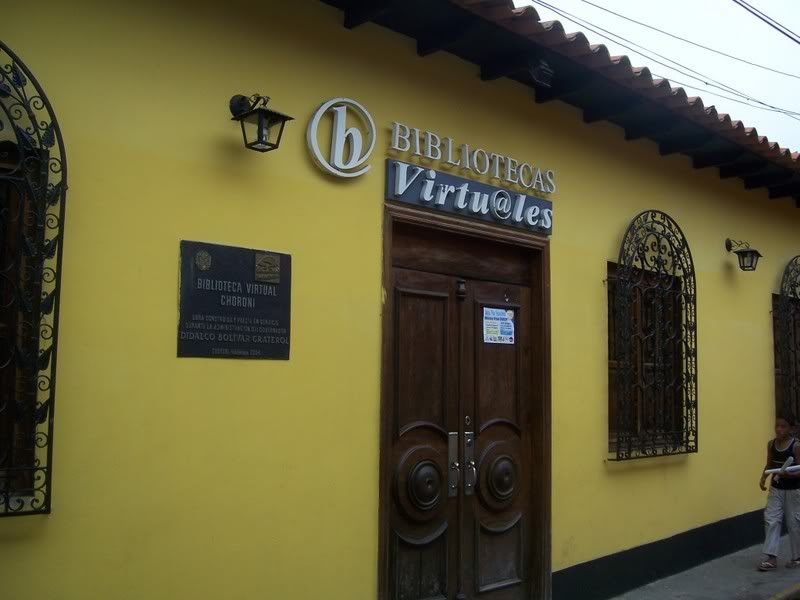
Curious about what these places that I keep running across are I decided to go inside.
What I found a a government financed computer and internet center.
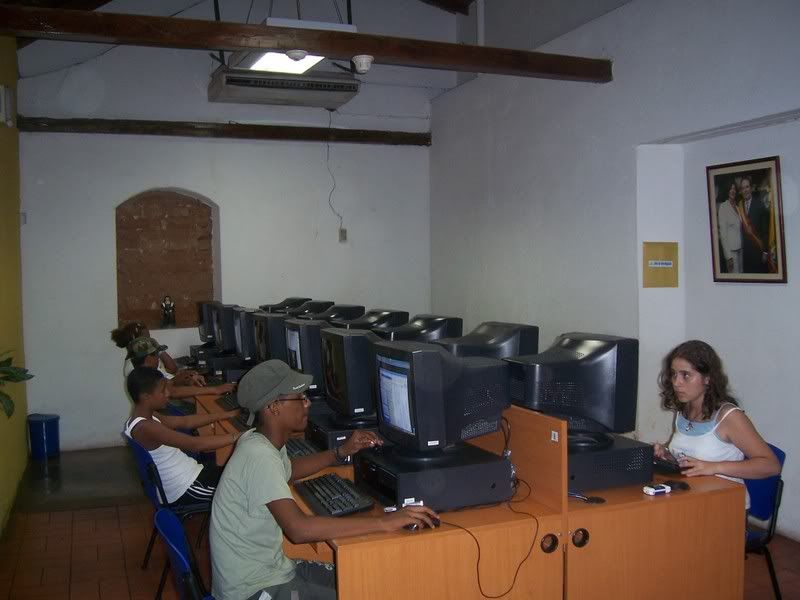
There were 14 computers available for the use by the general public. They had full internet access, the normal office software that people use, and printers. They also had high speed internet connections. Best of all, they are free, even for a gringo passersby.
Happy to sate my internet addiction I sat down and surfed for a while. Low and behold the internet connections are unrestricted, other than a sign saying they didn't want people accessing pornographic sites. But I did easily access sites such as Noticiero Digital and Globovision so obviously there is no restriction on political pornography.
Turns out there are scores of these sites throughout Aragua and they have been built and paid for by the state government, not the central government. Nationwide hundreds of similar sites have been built by the central government and are called "Info Centros" which I did see poor areas of Caracas such as El Valle and Antimano while I was there.
It is nice to see the Venezuelan government devoting resources to making sure even low income Venezuelans have access to computers and all the free and unrestricted information found on the internet. This clearly shows that rather than restricting peoples freedoms, as anti-Chavez propogandists often maintain, the Chavez government is expanding peoples access to information.
Having said this, I am not the biggest fan of just giving people access to computers and the internet. I don't think they are always the best teaching tool. Often Guttenberg's little invention is better. So it was good to see that this "Virtual Library" was something more than just a free government sponsored internet cafe.
It also had a nice open air room that was used as a classroom:
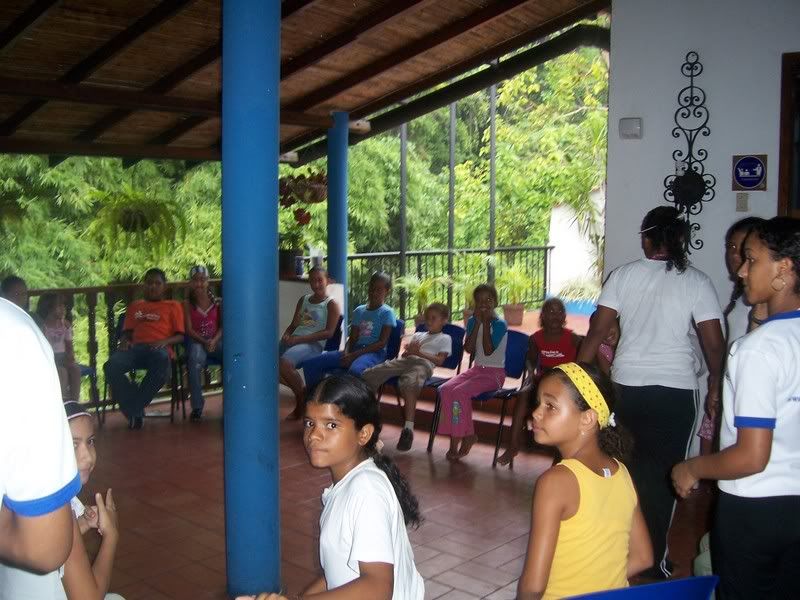
Given that this is August Venezuelan school children are on vacation. However this center was open to the children of the town they are given educational activities to both keep them busy and further their learning even when they aren't in class. Here they were playing a game involving spelling.
Better still, downstairs there was an actual library:
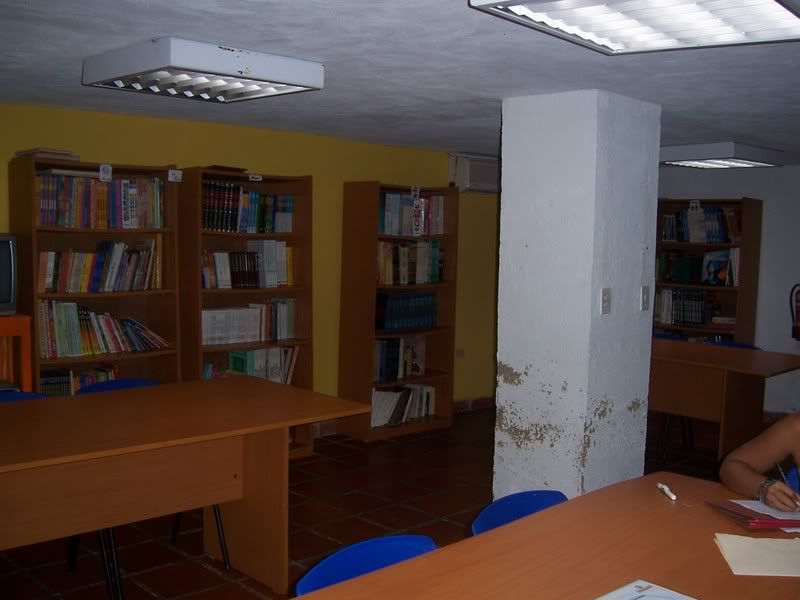
The library was small but well stocked, with an ample supply of things such as encylopedias. It also served as a quite study space which is important given that many Venezuelan homes are often crowded and noisy. It was also nice to see that this facility had long hours, from 9 a.m. to 9 p.m., even when school is not in session.
All in all the construction of these libraries throughout Venezuela seems like a fabulous idea and I am surprised they haven't received mention in media reports that come out of Venezuela. Then again, most foreign reporters in Venezuela seem more interested in talking about mythical Hummers than the countries expansive social programs.
Oh, and while on the subject of Hummers I finally did see one and manage to get my camera out and snap a picture of its butt before it drove away:
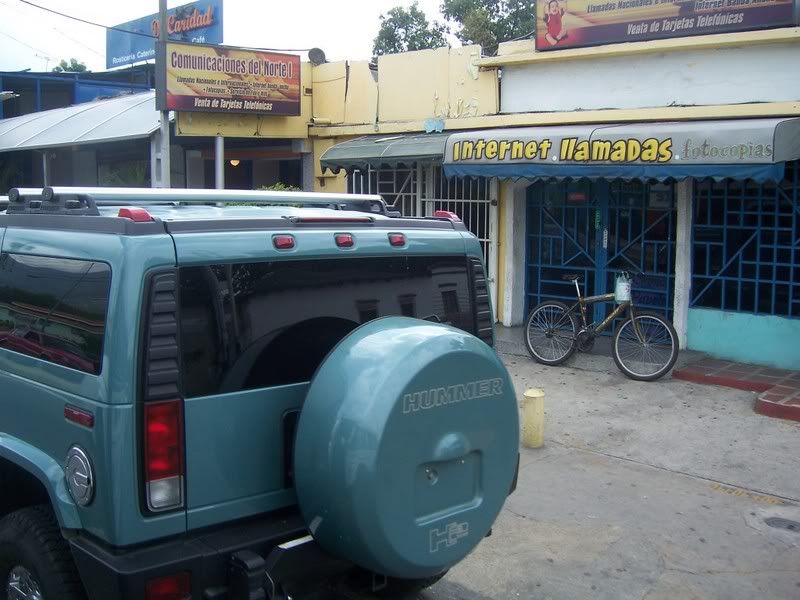
Ok, ok, I can hear it now - "That isn't a real Hummer, that is a crappy little Hummer 2". I know it is. But after a week and a half of going all over the place in a fruitless search for this things I'll take anything I can find.
But this does bring up an interesting point. In New York City one can easily see a half a dozen Hummers each day without even looking for them yet at the same time branch libraries have been closed or had their hours scaled back. In Venezuela, by contrast, the ostentatious luxury of Hummers is very rare yet new libraries are sprouting up like mushrooms after a rain all over the country. You would never know this listening to the anti-Chavez hacks but it is certainly true. And I think it says something about the difference in people's priorities in New York and peoples priorities in Venezuela.
It is also ironic how New York Times reporters, who should be familiar with both places, never seem to pick up on this contrast.
|


Curious about what these places that I keep running across are I decided to go inside.
What I found a a government financed computer and internet center.

There were 14 computers available for the use by the general public. They had full internet access, the normal office software that people use, and printers. They also had high speed internet connections. Best of all, they are free, even for a gringo passersby.
Happy to sate my internet addiction I sat down and surfed for a while. Low and behold the internet connections are unrestricted, other than a sign saying they didn't want people accessing pornographic sites. But I did easily access sites such as Noticiero Digital and Globovision so obviously there is no restriction on political pornography.
Turns out there are scores of these sites throughout Aragua and they have been built and paid for by the state government, not the central government. Nationwide hundreds of similar sites have been built by the central government and are called "Info Centros" which I did see poor areas of Caracas such as El Valle and Antimano while I was there.
It is nice to see the Venezuelan government devoting resources to making sure even low income Venezuelans have access to computers and all the free and unrestricted information found on the internet. This clearly shows that rather than restricting peoples freedoms, as anti-Chavez propogandists often maintain, the Chavez government is expanding peoples access to information.
Having said this, I am not the biggest fan of just giving people access to computers and the internet. I don't think they are always the best teaching tool. Often Guttenberg's little invention is better. So it was good to see that this "Virtual Library" was something more than just a free government sponsored internet cafe.
It also had a nice open air room that was used as a classroom:

Given that this is August Venezuelan school children are on vacation. However this center was open to the children of the town they are given educational activities to both keep them busy and further their learning even when they aren't in class. Here they were playing a game involving spelling.
Better still, downstairs there was an actual library:

The library was small but well stocked, with an ample supply of things such as encylopedias. It also served as a quite study space which is important given that many Venezuelan homes are often crowded and noisy. It was also nice to see that this facility had long hours, from 9 a.m. to 9 p.m., even when school is not in session.
All in all the construction of these libraries throughout Venezuela seems like a fabulous idea and I am surprised they haven't received mention in media reports that come out of Venezuela. Then again, most foreign reporters in Venezuela seem more interested in talking about mythical Hummers than the countries expansive social programs.
Oh, and while on the subject of Hummers I finally did see one and manage to get my camera out and snap a picture of its butt before it drove away:

Ok, ok, I can hear it now - "That isn't a real Hummer, that is a crappy little Hummer 2". I know it is. But after a week and a half of going all over the place in a fruitless search for this things I'll take anything I can find.
But this does bring up an interesting point. In New York City one can easily see a half a dozen Hummers each day without even looking for them yet at the same time branch libraries have been closed or had their hours scaled back. In Venezuela, by contrast, the ostentatious luxury of Hummers is very rare yet new libraries are sprouting up like mushrooms after a rain all over the country. You would never know this listening to the anti-Chavez hacks but it is certainly true. And I think it says something about the difference in people's priorities in New York and peoples priorities in Venezuela.
It is also ironic how New York Times reporters, who should be familiar with both places, never seem to pick up on this contrast.
|
Sunday, August 12, 2007
Can´t complain about these numbers
I still am not in a good place to upload pictures. But there are some very interesting poll numbers that I can manage to type even without a USB connection.
They come from the last page of the August 10th edition of Quinta Dia and are the numbers from a Sejias poll, ie they are from one of Venezuela´s more reliable polling firms. Without further introduction here they are:
General situation of the country:
Excellent 5.7%
Good 42.4%
Bad 22.3%
Terrible 18.8%
No answer 10.8%
Don´t worry, that is probably the worst set of numbers in the whole poll.
The three principal problems that the country confronts currently (spontaneous answers):
Crime 81.1%
Unemployment 43.3%
High cost of living 19.8%
Political instability 19.3%
Poverty 14.5%
Health 12.5%
Lack of housing 12.3%
Public services 11.3%
Shortages 11%
Condition of roads 6.2%
Corruption 5.6%
Education 5.4%
Water 2.9%
Others 5.7%
No Response 2.2%
No surprises here. The real issues of the country, out of control crime and the need for more jobs are way up on the list. The supposed that don´t really exist to any great extent outside of Globovision´s studios - corruption, lack of housing, and "shortages", are way down on the list.
Do you agree with "21st Century Socialism":
Agree 31.8%
Disagree 23.3%
No enough information 41.3%
No response 3.5%
Preferred system of government:
Social Democracy 62%
Socialism 21.7%
Communism 5.5%
Capitalism 5.3%
No response 5.6%
That social democracy, a mixed economy with extensive social programs, wins easily didn´t surprise me. That communism edged out capitalism was interesting!
The importance of consitutional reform, elaborated by the commission named by President Chavez, for the country:
Very important 61.5%
Somewhat important 17%
Not important at all 16.7%
No response 4.5%
Do you agree with the decision of the government to freeze the tuition of private educational institutions:
Agree 62.4%
Somewhat agree 17%
Disagree 17.4%
No response 3.2%
The reason the government decided to freeze tution:
To eliminate private education 21.5%
The private schools were speculating with tuition 72.1%
No response 6.4%
Regarding the protests of the professors and students in favor of university autonomy:
Agree with university autonomy 65.2%
Disagree with university autonomy 26.6%
No response 8.3%
Regarding university autonomy:
It should be kept 47.1%
It should be changed 40.8%
It should be eliminated 7.3%
Do you support the current student movement?:
Support it 72.6%
Don´t support it 16.8%
No response 10.6%
Ahhh, it sounds like the opposition finally got a number in this poll that it would like. But not really. Check out the following question.
Which student movement has more of a future?:
The student movement opposing the government 29.5%
The student movement that supports the government 56.3%
No response 14.3%
Gee, I guess the rich students who showed they had nothing to say by walking out of the National Assembly didn´t do themselves any favors. Maybe next time they should find someone besides ARS Publicidad to write their scripts.
Regarding the Chavez government and the rest of the world:
It is isolating Venezuela from the rest of the world 32.8%
It is strengthening Venezuela´s position in the rest of the world 58.8%
No response 8.3%
Regarding the Copa America:
It was a success 77.9%
It was a failure 15.1%
No response 7%
Hugo Chavez´s performance as president of Venezuela:
Excellent 17%
Good 30.1%
Regular to good 25.8%
Regular to bad 10.6%
Bad 6.8%
Terrible 8.8%
No response 1.1%
This adds up to about a 74% approval rating for Chavez!!!!!!!!!
You´d be hard pressed to find a president on the planet that wouldn´t be estatic over those numbers!
The situation of the country over the 8 years of the Chavez administration:
Has improved 52.1%
Has stayed the same 19.8%
Has gotten worse 26.5%
No response 1.7%
Again, solid numbers
And what follows is what in my view is the most meaningful and important set of numbers in this poll and in any poll.
Regarding you and your family personally how have things changed during the 8 years of the Chavez government:
They have improved 45%
They have stayed the same 36.7%
They have gotten worse 17.8%
No response .4%
The reason I said this was the most important question is that whether people see their own lives getting better or worse determines whether they will vote for any incumbant government and it is also the question least likely to be effected by pro or anti government propoganda.
And looking at these numbers Chavez is doing great. Almost half the country says things have improved for them and their family while less than a fifth say they have gotten worse. As long as those numbers stay that way it is hard to envision Chavez losing any vote.
A final question which isn´t nearly as meaningful, but still is interesting:
What political party do you belong to and/or support?:
PSUV 17.9 % (pro-Chavez)
MVR 14.2% (pro-Chavez)
Un Nuevo Tiempo 5.2% (opposition)
Primero Justicia 3.5% (opposition)
Patria Para Todos 2.2% (pro-Chavez)
Accion Democratica 2.1% (opposition)
Proyecto Venezuela 1.8% (opposition)
Podemos 1.6% (pro-Chavez)
Copei 1.5% (opposition)
Alianza Bravo Pueblo .8% (opposition)
Causa R .4% (opposition)
Tupamaro .4% (pro-Chavez)
MAS .2% (opposition)
No party 43.2%
No response 4.7%
As you can see, the opposition may have more political parties, but Chavez has more supporters.
In summary, this comprehensive polls shows that Venezuelans view the situation of the country as good, their own personal situation as improving, and they LOVE Chavez.
|
They come from the last page of the August 10th edition of Quinta Dia and are the numbers from a Sejias poll, ie they are from one of Venezuela´s more reliable polling firms. Without further introduction here they are:
General situation of the country:
Excellent 5.7%
Good 42.4%
Bad 22.3%
Terrible 18.8%
No answer 10.8%
Don´t worry, that is probably the worst set of numbers in the whole poll.
The three principal problems that the country confronts currently (spontaneous answers):
Crime 81.1%
Unemployment 43.3%
High cost of living 19.8%
Political instability 19.3%
Poverty 14.5%
Health 12.5%
Lack of housing 12.3%
Public services 11.3%
Shortages 11%
Condition of roads 6.2%
Corruption 5.6%
Education 5.4%
Water 2.9%
Others 5.7%
No Response 2.2%
No surprises here. The real issues of the country, out of control crime and the need for more jobs are way up on the list. The supposed that don´t really exist to any great extent outside of Globovision´s studios - corruption, lack of housing, and "shortages", are way down on the list.
Do you agree with "21st Century Socialism":
Agree 31.8%
Disagree 23.3%
No enough information 41.3%
No response 3.5%
Preferred system of government:
Social Democracy 62%
Socialism 21.7%
Communism 5.5%
Capitalism 5.3%
No response 5.6%
That social democracy, a mixed economy with extensive social programs, wins easily didn´t surprise me. That communism edged out capitalism was interesting!
The importance of consitutional reform, elaborated by the commission named by President Chavez, for the country:
Very important 61.5%
Somewhat important 17%
Not important at all 16.7%
No response 4.5%
Do you agree with the decision of the government to freeze the tuition of private educational institutions:
Agree 62.4%
Somewhat agree 17%
Disagree 17.4%
No response 3.2%
The reason the government decided to freeze tution:
To eliminate private education 21.5%
The private schools were speculating with tuition 72.1%
No response 6.4%
Regarding the protests of the professors and students in favor of university autonomy:
Agree with university autonomy 65.2%
Disagree with university autonomy 26.6%
No response 8.3%
Regarding university autonomy:
It should be kept 47.1%
It should be changed 40.8%
It should be eliminated 7.3%
Do you support the current student movement?:
Support it 72.6%
Don´t support it 16.8%
No response 10.6%
Ahhh, it sounds like the opposition finally got a number in this poll that it would like. But not really. Check out the following question.
Which student movement has more of a future?:
The student movement opposing the government 29.5%
The student movement that supports the government 56.3%
No response 14.3%
Gee, I guess the rich students who showed they had nothing to say by walking out of the National Assembly didn´t do themselves any favors. Maybe next time they should find someone besides ARS Publicidad to write their scripts.
Regarding the Chavez government and the rest of the world:
It is isolating Venezuela from the rest of the world 32.8%
It is strengthening Venezuela´s position in the rest of the world 58.8%
No response 8.3%
Regarding the Copa America:
It was a success 77.9%
It was a failure 15.1%
No response 7%
Hugo Chavez´s performance as president of Venezuela:
Excellent 17%
Good 30.1%
Regular to good 25.8%
Regular to bad 10.6%
Bad 6.8%
Terrible 8.8%
No response 1.1%
This adds up to about a 74% approval rating for Chavez!!!!!!!!!
You´d be hard pressed to find a president on the planet that wouldn´t be estatic over those numbers!
The situation of the country over the 8 years of the Chavez administration:
Has improved 52.1%
Has stayed the same 19.8%
Has gotten worse 26.5%
No response 1.7%
Again, solid numbers
And what follows is what in my view is the most meaningful and important set of numbers in this poll and in any poll.
Regarding you and your family personally how have things changed during the 8 years of the Chavez government:
They have improved 45%
They have stayed the same 36.7%
They have gotten worse 17.8%
No response .4%
The reason I said this was the most important question is that whether people see their own lives getting better or worse determines whether they will vote for any incumbant government and it is also the question least likely to be effected by pro or anti government propoganda.
And looking at these numbers Chavez is doing great. Almost half the country says things have improved for them and their family while less than a fifth say they have gotten worse. As long as those numbers stay that way it is hard to envision Chavez losing any vote.
A final question which isn´t nearly as meaningful, but still is interesting:
What political party do you belong to and/or support?:
PSUV 17.9 % (pro-Chavez)
MVR 14.2% (pro-Chavez)
Un Nuevo Tiempo 5.2% (opposition)
Primero Justicia 3.5% (opposition)
Patria Para Todos 2.2% (pro-Chavez)
Accion Democratica 2.1% (opposition)
Proyecto Venezuela 1.8% (opposition)
Podemos 1.6% (pro-Chavez)
Copei 1.5% (opposition)
Alianza Bravo Pueblo .8% (opposition)
Causa R .4% (opposition)
Tupamaro .4% (pro-Chavez)
MAS .2% (opposition)
No party 43.2%
No response 4.7%
As you can see, the opposition may have more political parties, but Chavez has more supporters.
In summary, this comprehensive polls shows that Venezuelans view the situation of the country as good, their own personal situation as improving, and they LOVE Chavez.
|
